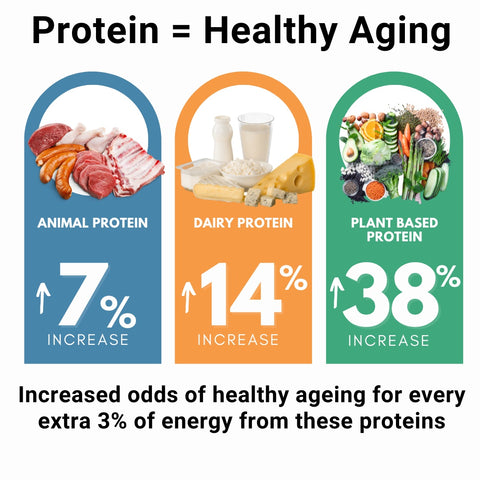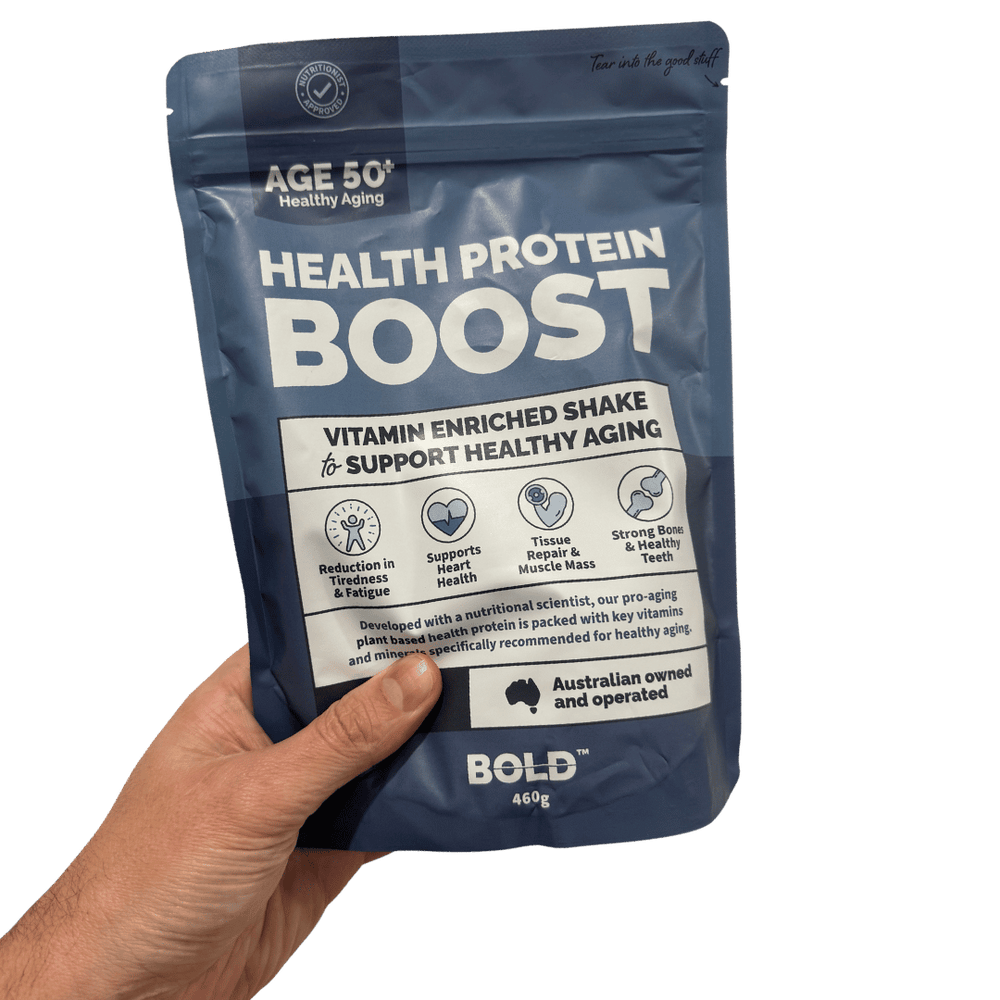Your best bet. Increase your odds of healthy aging with Plant Proteins.

Study Overview
A higher protein intake, especially plant protein, in midlife is associated with higher odds of healthy aging according to a new Dietary protein intake study.[i]
By simply increasing your daily intake of plant protein by 3%, you could improve your odds of healthy aging by 38%
The major study analysed over 48,00 women over a 30 year period from the ages of 38 up to 93 years old.
The women studied were 38 to 59 years old in 1984 and in good physical and mental health at that time.
By the time they were 70-93 years old, 3,721 (7.6%) of the women were rated as healthy agers (Our 'Super Agers') with no diagnoses of chronic disease, no memory complaints, no physical function limitations, and good mental health status.
The study compared their dietary patterns over time.
The authors looked at 4 key areas of healthy aging:
- The absence of chronic disease (including cancer, type 2 diabetes, cardiovascular diseases, kidney failure, and Parkinson’s disease),
- No impairments in memory or physical health (no limitations in moderate activities)
- Easily walking short distances and only moderate limitations in more vigorous activities like lifting heavier objects, or playing some sport) and
- Better mental health.
What do we know about those healthy aging superstars and their diet?
The analysis of dietary protein types highlights the benefit of all proteins, but especially plant proteins in midlife.
- For every extra 3% of energy from animal protein the women had 7% higher odds of healthy ageing.
- For every extra 3% of energy from dairy protein, the women had 14% higher odds of healthy aging.
- For every 3% extra energy from plant protein, they had 38% higher odds of healthy ageing.

Note: A 3% increase in energy from protein in an average diet of 8,700 kJ is about 260 kJ or about 15 g of protein. (If you are worried about weight gain, this means switching out some refined carbohydrates or saturated fats for the extra plant-based protein)
The authors analysed different protein sources in the womens’ diets and the key areas of healthy aging. Dairy protein and plant protein were both associated with a lower risk of chronic disease. There was no association between any type and amount of protein intake and lesser memory impairment. Only increased plant protein was significantly associated with good mental health status.
The results align with what we know about protein intake and good health in older adults, so it is not surprising to find that increasing protein in midlife has benefits.
Good sources are legumes like dried beans and chickpeas, tofu, and plant-based protein shakes like Bold Health Protein Boost.

Louise Fisher is Bold’s nutrition scientist.
Louise did a mid-life pivot from her first career as a lawyer, and in true Bold style she was awarded a BSc (Nutrition) with Honours Class 1 and the University Medal. She practiced as a clinical dietitian for 10 years and has a personal interest in healthy aging, diet and exercise.
Study Notes:
The study analysed health and dietary patterns for over 48,000 women in the Nurses Health Study - a long running prospective cohort study (a study that follows groups of similar individuals over time to see how risk factors affect health outcomes) .
The data was cut in a few ways to try reduce the effect of confounding factors - results were adjusted for weight (BMI) and other factors such as smoking history, alcohol use and physical activity.
As always, use judgement in applying the conclusions to your individual circumstances.
The results from the large cohort studies like this one are good at highlighting major patterns, despite some weaknesses. Some of the health results were self-reported and individuals may have changed dietary patterns during the study. The study population was mostly white females. It is impossible to avoid all confounding factors
References
[i] Dietary protein intake in midlife in relation to healthy aging – results from the prospective Nurses’ Health Study cohort. Ardisson Korat AV, Shea MK, Jacques PF, Sebastiani P, Wang M, Eliassen AH, Willett WC, Sun Q. Dietary protein intake in midlife in relation to healthy aging – results from the prospective Nurses’ Heath Study cohort. Am J Clin Nutr. 2024;
119(2): 271-282.


